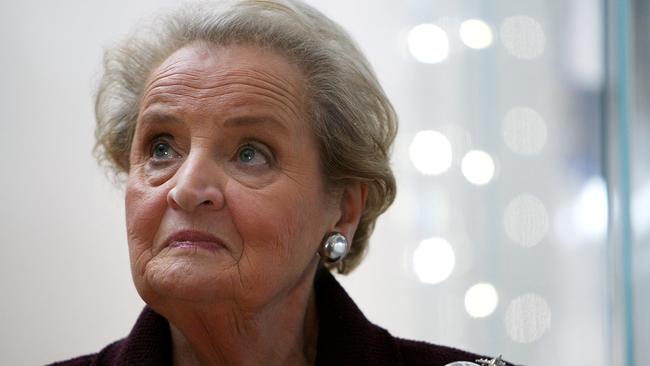Madeleine Albright, first woman to serve as Secretary of State, dies
As America’s top diplomat Madeleine Albright presided over the aftermath of the Cold War, renegotiating ties with Russia.

Madeleine Albright, who as secretary of state during the Clinton administration became the first woman to serve as the nation’s top diplomat, has died. She was 84.
Ms. Albright presided over US diplomacy in the aftermath of the Cold War, renegotiating the nation’s relationship with Russia and advocating the enlargement of the North Atlantic Treaty Organization by including former Soviet states.
Her own experiences with authoritarian governments during her formative years shaped Ms. Albright’s approach to the world and meant she paid particular attention to issues in Eastern Europe. Her native Czechoslovakia fell under the sway of first Adolf Hitler, then Joseph Stalin, leading her family to flee the country.

A facility with languages -- she spoke fluent Czech and French, and conversational Polish and Russian -- enhanced her ability to build rapport with foreign counterparts. She remained friendly with Russia’s Yevgeny Primakov, a former intelligence chief who served as foreign minister and later prime minister, despite challenges in the relationship between their countries.
Ms. Albright penned a remembrance of Mr. Primakov in Foreign Policy upon his 2015 death, recalling their conversations about the state of U.S.-Russian relations.
“The challenge was bridging the divide between our approach to post-Cold War European security and Russia’s,” she wrote. “He loved his country. Yet he was pragmatic. He believed in the importance of solving difficult issues in U.S.-Russian relations. I miss that time.” Her own personal experience with fascism made Ms. Albright a more effective diplomat, said James Rubin, who served as State Department spokesman under Ms. Albright.

Serbian leader Slobodan Milosevic committed genocide in Bosnia and would have done the same in Kosovo but for U.S. intervention, Mr. Rubin said. Ms. Albright “played a decisive role in gathering the forces of the West to stop a genocide before it happened and to not dither for years the way we did in Bosnia,” Mr. Rubin said.
As the first female secretary of state, Ms. Albright established a pattern that quickly became familiar: Two of the next three people to hold the post, Condoleezza Rice and Hillary Clinton, were women.
At the time of her appointment, Ms. Albright was the highest-ranking woman ever in the U.S. government; she later described her initial trepidation and facing sexist opposition not from foreign counterparts, but from Americans, although she expressed pride that other women followed her into the top diplomatic post.

While campaigning for Mrs. Clinton during the 2016 presidential race, Ms. Albright drew criticism for saying, “There’s a special place in hell for women who don’t help each other.” Some prospective Democratic voters took umbrage at Ms. Albright, who was invoking an adage she had frequently used over the years.
Before becoming secretary in January 1997, Ms. Albright served as U.S. ambassador to the United Nations and was a member of then-President Bill Clinton’s National Security Council.
Born Marie Jana Korbelová on May 15, 1937 in Prague, Czechoslovakia, to Czech diplomat Josef Korbel and Anna Spieglová, Ms. Albright was raised in and around London, as well as Belgrade, Yugoslavia, and was educated in Switzerland before her family immigrated to the U.S. in 1948.

She changed her name from Marie Jana to Madeleine -- a childhood nickname -- while living in Switzerland and studying French as an adolescent.
After graduating from Kent Denver School in Colorado, she earned a Bachelor of Arts degree from Wellesley College in political science, and a master’s degree and a doctorate from the Columbia University Department of Law and Government. Ms. Albright also studied at Johns Hopkins University’s School of Advanced International Studies and earned a certificate from Columbia’s Russian Institute.
A 1959 marriage to Joseph Medill Patterson Albright, the scion of a noted publishing family, ended in divorce.
Ms. Albright has been awarded honorary doctorates by institutions including Brandeis University, Smith College, the University of North Carolina at Chapel Hill, and Washington University in St. Louis.
The former secretary wrote several bestselling books, including 2003’s “Madam Secretary: A Memoir” and 2018’s “Fascism: A Warning.” In 2020’s “Hell and Other Destinations,” Ms. Albright described plans for her “afterlife” -- the period following her service as secretary of state, during which she hoped to regain some measure of privacy while remaining productive.
“It was an exhausting list. Common sense, and actuarial tables, suggested that I limit the demands on my schedule. However, I was intent on making the next stage of my life even more exciting than the last. I said, ‘Hell, yes,’ to everything.” She served on the Pentagon’s Defense Policy Board, a group of outside experts charged with advising the secretary of defense, and in 2009 led a panel responsible for formulating a new strategic concept for NATO.
The Wall Street Journal





